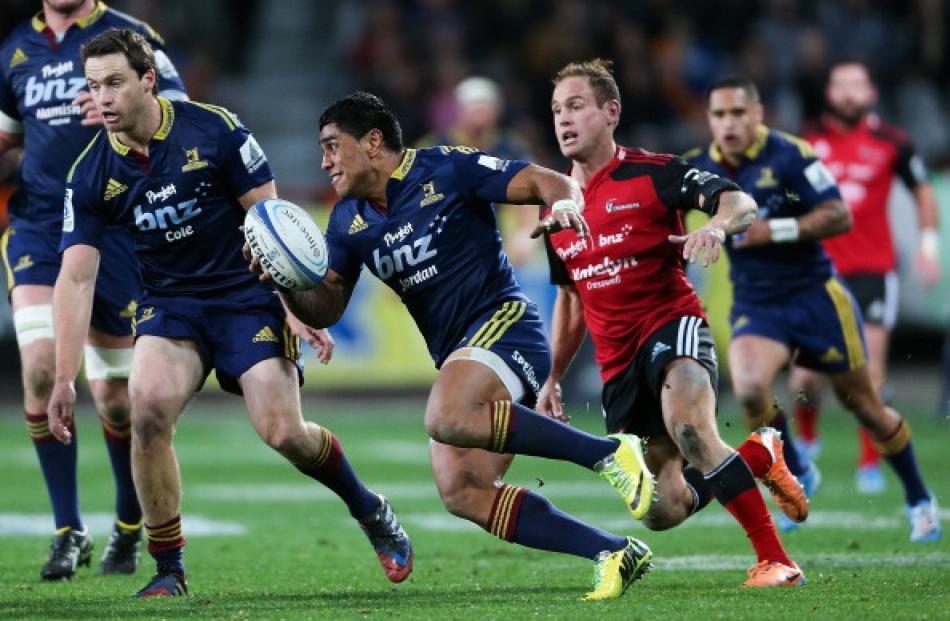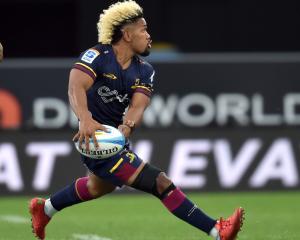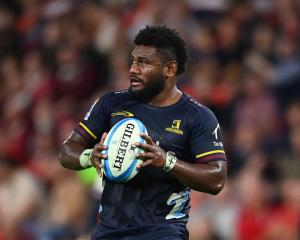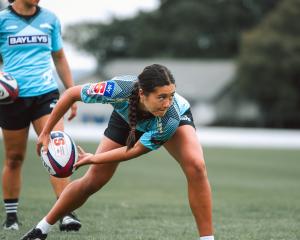ODT Online rugby writer Jeff Cheshire casts his eye back at the Highlanders' season to look at what worked, and what needs to be done if the team are to improve on their place this year.
What worked well
Lethal backs
The attack of this Highlanders backline was their best asset. They had multiple attacking threats, all of whom were used well. Malakai Fekitoa added the spark that had been lacking in the midfield, while the back three all took gaps well and were tough to drag down. On the counter they were just as dangerous, spearheaded by Ben Smith from the back. Smith has an uncanny knack of seeing gaps and stepping out of tackles. Others ran off him well and made use of the gaps opened up by the defenders attracted to him.
Inside these men there were a lot of good things happening that got the ball into space. Aaron Smith consistently passed well, while also sniping dangerously. This meant that the backs were getting quicker ball in more room, as a guard dog was necessary to defend Smith's runs. Both first five-eighths were good too, taking the ball to the line and getting it through their hands quickly when necessary. In the middle of it all, Shaun Treeby and Phil Burleigh were the tidy links who made every stick.
Mobile and aggressive forwards
The 2013 Highlanders struggled up front. They were too slow around the field, too inaccurate at the breakdown and were not aggressive enough in contact.
This year they were much better. Having Nasi Manu back made a huge difference. He provided them with go-forward in his ball carrying, which was something no one did last year. His impact in contact on defence was felt too. This meant the men in front of him could just toil away the whole game, working consistently hard, rather than having to make big impact plays. Everyone did well in this area, although Kane Hames, Chris King and Joe Wheeler were stand outs. Having a highly active tight five was a big plus and made the team so much tougher to break through. It also allowed Shane Christie to focus on tackling and speed around the field. He did this well, which showed in his high tackle counts.
They were far more aggressive this year too. In their best performances, they would push up fast and make big tackles. Rucks were hit hard and ball runners fought to gain metres. Notably in games against the Sharks, Bulls and Hurricanes this was prevalent and was a key reason for those three wins.
Squad depth
There were not too many weak positions in this year's Highlanders team. You would not have wanted to lose Nasi Manu, Aaron Smith or Ben Smith, but otherwise, everyone had a reasonable back-up. At times they were forced to dig deep into these back-ups too. Lock was a particularly troublesome area for injuries. But such was the depth, the injuries were not a problem. Each of the five locks played well and Tom Franklin even played his way into regular game time.
At blindside flanker both Gareth Evans and Elliot Dixon were of similar value, with TJ Ioane adding impact. John Hardie was still good when he played, it was only Christie's top form that kept him out of the team. Each of the three hookers were hard-workers, while Ma'afu Fia played himself into good form too. The backs had tidy options in Fumiaki Tanaka, Hayden Parker and Phil Burleigh backing up, while Trent Renata's value as a utility made him important. All were handy players at some stage. This made injuries less of an issue, while changes could be made knowing that there was a quality option on the bench.
Goal-kicking
It was the Highlanders' best goal-kicking season for a long, long time. Lima Sopoaga became a legitimate top kicker, knocking them over from all over the park. Hayden Parker was his usual reliable self when he played too. In fact, there would be few goal-kickers in world rugby better than these two men. To have the option of having both, the coaching staff had the luxury of being able to make changes, knowing they would not lose too much in the goal-kicking department.
Coaching team
The coaches deserve plenty of credit for the way this year went. So often they get the blame when things go wrong, but often remain under the radar when things go well. They seemed to have learnt a lot from last year and that is what you want to see after such a poor season.
Selections were more consistent. This allowed them to gel well as a team. Some of these selections were gems too. Malakai Fekitoa, Kane Hames, Shane Christie and Richard Buckman were all plucked out of the wilderness to play key roles. Likewise, the decision to bring back Joe Wheeler turned out to be an inspired one.
There was more of a game plan on show and they looked a lot more organized on the field too. They had some good set-plays and looked far more lively in the backs, which no doubt had a lot to do with Tony Brown coming on board. It was also good to see the team playing to their strengths more often and the best being found in so many players.
What needs work
Set-piece
At times the set-piece did operate well. But against the top teams in the games where it really needed to be good, it was not. The scrum went backwards and gave away penalties nearly every time it packed down. This not only deprived the backs of good ball, it gave the opposition kicks at goal. At lineout time they were not a lot better. Too often the jumper was missed and at times the moves seemed a little too complicated.
That is not to say that it was all bad though. There were games when the lineout worked well, while the scrum also had the odd dominant outing. To win the competition, you have to do it against the best teams though. This was where, and when, the Highlanders were lacking.
Closing out games
There were a lot of close wins this year that there did not need to be. Particularly early on, they seemed to have a habit of getting a good lead and then letting their opponent back into the game.
The most memorable example came against the Lions, but it was also seen against the Hurricanes, Blues and Rebels. These were all games where the Highlanders had played great rugby and looked on the verge of putting up a big score. But they faltered. Perhaps it is a mental thing. When you are in this situation you cannot afford to let the opposition back in the game. You bury them. You do not give them a sniff. Fortunately, more often than not, the Highlanders came out on the right side of these results. But some of them were near-things and need to be worked on for next year.
Inconsistent early on
It seems a long time ago now, but early on this season the Highlanders struggled for consistency. Not just in the results, but in the way they played. They would look brilliant one week, running the ball from everywhere, winning the physical contest and playing error-free rugby. The next week they would fail to fire, lack urgency and be inaccurate in both the backs and forwards. This was exposed by the Force and Blues, who both beat Highlanders teams that were off the pace.
They only really began to show consistency in April, when they went on a three-match winning streak. This included their South African trip and was their best period of the year. If they had have found consistent form more often early on, they would have finished higher up on the table and had a much better chance in the playoffs.
Finished season poorly
It has been a hallmark of Highlander teams under Jamie Joseph and 2014 was no different. There is no denying the Highlanders' worst games came late in the season. Admittedly they came against the two top teams in the competition, but they were comprehensively out-played. They showed great resolve to get up in South Africa in the playoffs and showed what they are capable of. To be the best you have to be able to beat the best though, and after such a close game against the Crusaders first time around, it was disappointing to get bullied in the second. These last few games were crucial in the end too and even a few bonus points could have made a huge difference.











